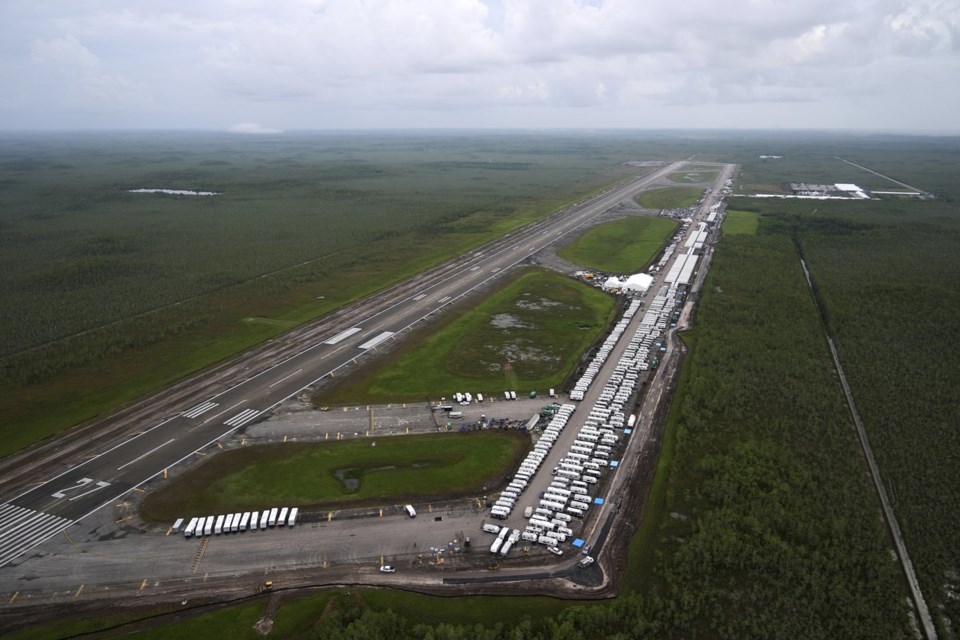MIAMI (AP) — The fate of a makeshift immigrant detention center in the Florida Everglades dubbed “ Alligator Alcatraz ” hung in the balance on Wednesday as a federal judge considered whether building on sensitive wetlands violated environmental laws.
Last week, U.S. District Judge Kathleen Williams ordered a 14-day halt on additional construction at the site while witnesses testified at a hearing, part of a lawsuit seeking to halt operations and further construction. The temporary order doesn’t include any restrictions on law enforcement or immigration enforcement activity.
The judge concluded a multi-day hearing on Wednesday without making an immediate decision on whether to issue a preliminary injunction.
President Donald Trump toured the facility last month and suggested it could be a model for future lockups nationwide as his administration races to expand the infrastructure necessary for increasing deportations.
Environmental groups and a Native American tribe have sued over the facility, saying it was hastily set up without the environmental impact considerations needed for all federal projects, even though it deals with immigration, a federal matter.
“It just flies in the face of what NEPA requires,” said Paul Schwiep, an attorney for the environmental groups, referring to the National Environmental Policy Act.
Florida and the Trump administration argue that the state is building and operating the detention center, so those rules about an environmental review don't apply. Adam Gustafson, an attorney for the federal government, said during the hearing’s closing arguments Wednesday that the federal government only plays an advisory role at the facility.
The judge last week said the center was, at a minimum, a joint partnership between the state and federal government.
The first phase of “Alligator Alcatraz” opened in July atop a lightly used, single-runway training airport. Less than 1,000 detainees were being held there as of last week, and it’s designed to eventually hold up to 3,000 people.
Inside the compound’s large white tents, rows of bunkbeds are surrounded by chain-link cages. People held there say worms turn up in the food, toilets don’t flush and flood floors with fecal waste, while mosquitoes and other insects are everywhere. At times the air conditioners abruptly shut off in the sweltering heat. Detainees are said to go days without showering or getting prescription medicine, and can only speak to lawyers and loved ones by phone.
Gov. Ron DeSantis has said the location in the rugged and remote Everglades was meant as a deterrent against escape, much like the island prison in California that Republicans named it after. The detention center has an estimated annual cost of $450 million, according to a public database.
When asked by the judge why a detention facility needed to be located in the middle of the Everglades, Jesse Panuccio, an attorney representing the state of Florida, referred to government officials’ statements that the remote location and existing runway made it ideal for immigration detention. Williams pointed out many other detention centers were operated safely and effectively in urban areas.
“Florida is lousy with airports,” the judge said. “Why in the middle of the Everglades?”
Witnesses for the environmental groups have testified that at least 20 acres (8 hectares) of asphalt have been added to the site since the Florida Division of Emergency Management began construction. They said additional paving could lead to an increase in water runoff to the adjacent wetlands, spread harmful chemicals into the Everglades and reduce the habitat for endangered Florida panthers.
Chris Ajizian, an attorney for the Miccosukee Tribe, said that neither the state nor federal government gave the tribe any notice of their plans for a detention facility, despite legal obligations and the tribe’s incontrovertible connection to the Everglades.
“It is the life blood of their community, their history and their identity,” Ajizian said during the hearing’s closing.
The lawsuit was being heard as DeSantis′ administration was apparently preparing to build a second immigration detention center at a Florida National Guard training center in the state's north.
A second lawsuit claims detainees’ constitutional rights are being violated because they are barred from meeting lawyers, are being held without any charges, and a federal immigration court has canceled bond hearings. Over the weekend, a federal judge gave the state until late September to prepare arguments against an effort to get the civil rights litigation certified as a class action.
David Fischer, The Associated Press




